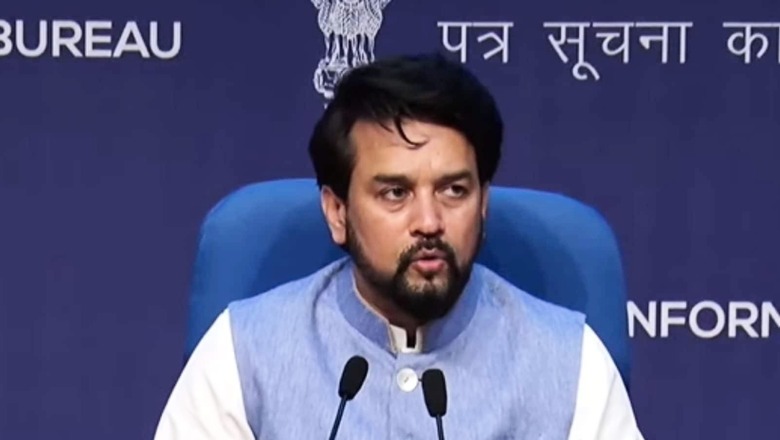
views
Parliament on Wednesday passed a bill which seeks to provide a statutory framework for the functioning of the National Anti-Doping Agency (NADA) and the National Dope Testing Laboratory (NDTL).
The National Anti-Doping Bill, 2022 was passed by a voice vote in the Rajya Sabha. It was cleared by the Lok Sabha last week along with certain official amendments.
Sports and Youth Affairs Minister Anurag Thakur while responding to debate on the bill said that currently India can carry out only about 6,000 tests a year, and the law would help in increasing the testing capacity significantly. He said to hold any large international championship, the number of tests required could be as high as 10,000 a month.
Thakur also said that with passage of this bill, India will join the club select countries like, the US, China, Japan, and France, which have their own laws related to check doping in sports.
The minister stressed that in order to organise international tournaments in India there was a need to increase the strength of testing laboratories. “This bill will safeguard the interest and rights of the sportspersons,” Thakur said.
The bill was introduced in the Lok Sabha in December last year and had undergone the scrutiny of a parliamentary committee.
THE AIM
To provide a statutory framework for the operation of the NADA, NDTL and other dope testing laboratories, and for creation of a National Board for Anti-Doping in Sports to strengthen anti-doping activities in sport.
It seeks to give NADA powers of investigation, levying sanctions for anti-doping rule violations, the disciplinary procedures to be adopted and the powers of inspection, sample collection and sharing and free flow of information.
PROHIBITING DOPING
The Bill states that no athlete, athlete support personnel or other persons shall indulge in doping in sport.
Every athlete, athlete support personnel and other persons shall be responsible for knowing what constitutes Anti-Doping Rule Violations and the restrictions on the use of prohibited substances and the prohibited methods which are included in the Prohibited List.
THE VIOLATIONS
The presence of a prohibited substance or its metabolites or markers in an athlete’s sample.
Use or attempted use of any prohibited substance or a prohibited method.
Refusing or failing, without compelling justification, to submit sample after notification.
The athlete has failed to submit his whereabouts information before the required deadline or to update the same after change in circumstances or if submitted on time, has submitted incomplete, inaccurate or insufficient information to locate him for testing.
Missed test, that is to say, though the athlete has filed his whereabouts information, he is not available at the location for testing.
Tampering, or attempting to tamper, with any part of doping control.
Possession of prohibited substances or prohibited methods.
Trafficking or attempted trafficking in any prohibited substance or prohibited method.
Administration or attempted administration of a prohibited substance or prohibited method to any athlete or to an athlete out of competition.
THE CONSEQUENCES
Disqualification of results with all consequences, including forfeiture of medals, points and prizes
Ineligibility to participate in any competition or event or other activity or funding, for such period and in such manner, as may be specified by the Agency
Provisional suspension from participating in any competition or activity prior to the decision in appeal Imposition of financial sanction including proportionate recovery of costs
The consequences of Anti-Doping Rule Violations for team sports shall be such as may be specified by regulations.
THE BOARD
The National Board for Anti-Doping in Sports shall consist of a Chairperson and two Members to be appointed by the Central Government.
Not holding a similar position, the Chairperson shall be a person who has knowledge and experience of not less than 20 years in the field of general administration, sport administration or is a retired eminent athlete.
A Member shall be a person with an experience of not less than 15 years in the field of general administration, medical sciences, law or is a retired eminent athlete.
Eminent athlete means a sportsperson who has been conferred with a national sports award or Padma award for his outstanding contribution to the development of national sports in terms of medals won in international events.
The term of office of the Chairperson and members shall be three years or till they attain the age of 65 years, whichever is earlier.
THE NADA
The NADA, established as a society, will now be a body corporate and shall have perpetual succession and a common seal with power, subject to the provisions of this Act, to acquire, hold and dispose of property, both movable and immovable, and to contract, and sue.
The Head Office of the Agency shall be at New Delhi.
The Agency shall be headed by an officer designated as the Director General to be appointed by the Central Government.
The Agency shall be responsible for adopting and implementing anti-doping rules and policies which conform with the Code and for promoting, coordinating, and monitoring the doping control programme in sports to ensure dope-free sport in India
The Agency may constitute committees for the discharge of its function under this Act, including Therapeutic Exemption Committee, Investigation Committee, Sample Collection and Testing Committee, Result Management Committee, Education Committee and Sanction Committee.
WHAT IT CAN DO
Where the Agency has reasons to believe that an athlete or athlete support personnel has committed an Anti-Doping Rule Violation, any person authorised by the Agency may, in accordance with the provisions of the Code of Criminal Procedure, 1973,—
(a) Enter any place for the purpose of inspecting, examining and determining a violation has been committed or is being committed.
(b) Search any premises
(c) Seize any equipment, device, substance, record, register, document or other material object, if such officer believes that it may furnish evidence of such Anti-Doping Rule Violation or that seizure is necessary to prevent or mitigate any Anti-Doping Rule Violation.
It can get an athlete to submit samples for testing
IF FOUND GUILTY…
After the issuance of a notice by the Agency to the athlete, if he or she does not waive his right of hearing, the Agency shall refer such matter to the Disciplinary Panel.
The Disciplinary Panel shall hear and determine all issues arising from any matter which is referred to it, and determine the consequences of Anti-Doping Rule Violations.
Every party shall have a right to be represented, and to have an interpreter, at their own cost.
With PTI Inputs
Read all the Latest News and Breaking News here
















Comments
0 comment